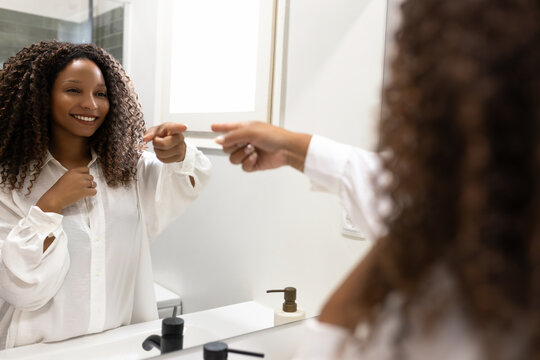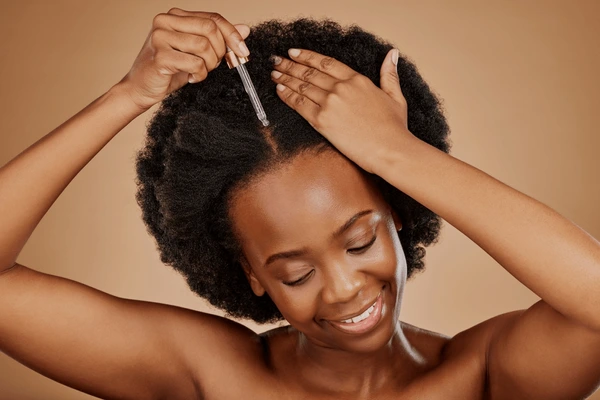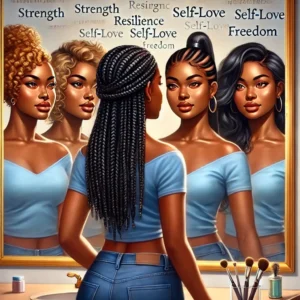
When I was a little girl, beauty felt like a mystery to me. But it wasn’t that I wanted to emulate White women—I didn’t. I wanted to emulate the Diana Rosses of the world and the little girls I’d see on the relaxer kits in the shops. They were the epitome of beauty to me, their sleek hair perfectly styled, their smiles radiant. As I got older and started secondary school, my focus shifted. It wasn’t distant icons like Janet Jackson or Lisa Lisa anymore; it was the girls at school—the ones with coolie hair or hair that was long, brushing past their shoulders.
In hindsight, my thing was always hair. It was my measure of beauty, the feature I felt needed to be “just right” to be considered beautiful. But now I know that for most Black girls growing up, there was always something. Maybe it wasn’t hair; maybe it was their nose they thought was too wide, their lips too full, their skin too dark, their body too wide—or a combination of all of these. The message was the same: something about us was always framed as needing to be fixed, hidden, or changed.
Growing up, I never realised how much power Eurocentric beauty standards had over me. What I also didn’t realise at the time was that even the Black celebrities and little girls on the relaxer kits I admired so much were bowing down under the weight of those same standards. They were emulating the dominant beauty ideal—the one rooted in Eurocentric features. I had no idea that the sleek, long hair I idolised wasn’t natural for most of them. I believed that Whitney, Chaka, Sister Sledge, and others had long, straight hair naturally. Maybe a few of them did, but the majority didn’t.
That illusion is damaging in ways that are hard to quantify. As a child, I didn’t question it; I simply believed that my own hair, as it grew from my scalp, wasn’t good enough. Seeing those images over and over again plants a seed of inadequacy in little Black girls, telling us that our natural beauty isn’t enough. It reinforces the idea that to be seen as beautiful—or even acceptable—we must conform to a standard that doesn’t celebrate us as we are.
By the time you realise the truth—that the sleek hair and polished looks were achieved with relaxers, wigs, weaves, and extensions—you’ve often already internalised the message. And it doesn’t stop there. You’ve likely already started playing along, perpetuating the same lie for the next generation.
I was no different. I began using the relaxer creams, burning my scalp in pursuit of the straight, silky hair I thought was a marker of beauty. When relaxers weren’t enough, I added extensions. Eventually, I moved on to wigs and weaves, piling on more layers of someone else’s hair to make up for what I thought I lacked. Without realising it, I became part of the cycle, passing the weight of those beauty standards onto the next generation of Black girls—just as it had been passed onto me.
The weight is heavy, not just physically but emotionally. As a heterosexual woman, that weight also comes from not wanting to be invisible to Black boys. To be seen by them, you had to prove that you were worth noticing—you had to have the latest hairstyle, your hair had to be “done,” you had to know fashion, because they grew up seeing the same images you did. They were under the spell too, measuring beauty by White standards and expecting us to conform to them.
I remember going to a club in the 90s where the crowd was mixed—Black, White, Asian, all shades and backgrounds. The young Black men in that space? They weren’t looking at me. It felt like I was invisible, like I didn’t exist in their eyes. I wasn’t straight-haired enough, light enough, or polished enough to compete with the standard they’d been conditioned to admire. That night, I left knowing one thing, I wouldn’t be socialising with that lot again! I ran back to the clubs where the crowd was 99.999% Black. Because even though I still had to succumb to the Eurocentric weight in those spaces—still had to keep my hair relaxed or wear the extensions to feel seen—at least there, I was seen.
 So, who defines your beauty? Is it the advertisers selling you products to “fix” what isn’t broken? Is it the celebrities who conform to Eurocentric standards to remain palatable? Or is it you?
So, who defines your beauty? Is it the advertisers selling you products to “fix” what isn’t broken? Is it the celebrities who conform to Eurocentric standards to remain palatable? Or is it you?
Choosing your own standard of beauty is an act of liberation. It’s saying, “I see myself, and I am enough.” It’s celebrating the features that make you unique, whether it’s your rich skin tone, your thick thighs, or your full lips. It’s recognizing that beauty isn’t a one-size-fits-all concept—it’s as diverse and dynamic as we are.
But let me pause here, because I know what I’m supposed to say next. I’m supposed to tell you to be bold, to stand strong, to define your own beauty unapologetically. And while I believe that wholeheartedly, I’m not here to tell you how to navigate this journey. The truth is, being a Black woman comes with enough stresses as it is.
Yes, representation matters. Yes, we are the blueprint. But if wearing a weave makes you feel better about your appearance or makes your life a bit easier in terms of time and management, then you go ahead and wear that weave. Don’t beat yourself up about it, and don’t let anyone else beat you up about it either.
Because here’s the thing: You could be fighting racism and oppression in ways no one sees. You could be pouring your love and care into raising the next generation, nurturing the next Denzel, Letitia Wright, or Raheem Sterling. Your strength, your beauty, your impact—it’s not always about what’s visible to the world.
 To my sisters reading this: You are enough, just as you are. You always have been. Whether you wear your natural hair, relax it, weave it, braid it, or rock a wig, your beauty is undeniable. The world has always drawn inspiration from us, from our style, our strength, and our resilience. And yes, it’s exhausting to constantly have to fight to be seen, heard, and valued.
To my sisters reading this: You are enough, just as you are. You always have been. Whether you wear your natural hair, relax it, weave it, braid it, or rock a wig, your beauty is undeniable. The world has always drawn inspiration from us, from our style, our strength, and our resilience. And yes, it’s exhausting to constantly have to fight to be seen, heard, and valued.
So, let’s give ourselves permission to do what we need to do to feel good, to make life just a little bit easier, to show up in this world in whatever way feels right for us. Let’s remind ourselves that our worth isn’t tied to how we look, but to how we live, how we love, and how we contribute to the world around us.
Every time you look in the mirror, remind yourself: I define my beauty. And that beauty isn’t diminished by the choices you make to care for yourself or to navigate this world.
The journey to self-acceptance isn’t always easy. Some days, it feels like climbing a mountain, battling the voices of doubt and insecurity. But every step you take is a step toward freedom—a step toward embracing the beauty that is already yours.
So, the next time you catch your reflection, ask yourself, Who defines your beauty? Then smile, because whether it’s with a twist-out, plaits, or a sleek ponytail, the answer is always the same: You do.
4-minute read Have you ever found yourself lying awake at night, heart heavy with worry about your teenager’s safety during interactions with the police? It’s a question that lingers for many parents and caregivers, especially when history and statistics both
4-minute read I’ve spent a lot of time thinking about beauty—what it means, who gets to define it, and whether it’s really as inclusive as we like to think. And the more I look at it, the more I realize
4-minute read Let’s be honest—the Hidden Agenda Behind Beauty Ads is everywhere. They follow us on our phones, pop up in our social feeds, and even sneak their way into our subconscious when we least expect it. One minute you’re